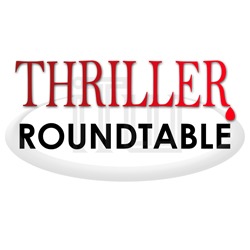

January 31-February 6: “Imagine you could reach out to any author (living or dead) and ask a single question. Who is the author? What is your question?”
 Join Mike Sirota, Lisa Black, Kelli Stanley, J. H. Bográn, Richard Godwin, and Weyman Jones as they discussion this intriguing Thriller Roundtable question. Remember – readers are welcome to add their opinion!
Join Mike Sirota, Lisa Black, Kelli Stanley, J. H. Bográn, Richard Godwin, and Weyman Jones as they discussion this intriguing Thriller Roundtable question. Remember – readers are welcome to add their opinion!
Don’t be late!
Mike Sirota is the author of nineteen previously published novels, including Demon Shadows and The Well (from Bantam Books) and the Bicycling Through Space and Time trilogy from Ace/Berkley. Formerly an award-winning journalist, he assists aspiring and published writers as an independent editor and writing coach. Mike lives in Oceanside, California with his wife, Jacqueline.
Lisa Black is a latent fingerprint examiner in Florida and a former forensic scientist for the Cleveland coroner’s office. She is a member of the American Academy of Forensic Sciences and has testified in more than forty-five homicide trials. Evidence of Murder is her third Theresa MacLean novel.
Kelli Stanley is an award-winning author of crime fiction. She writes two critically-acclaimed crime fiction series, one set in 1940 San Francisco (featuring hardboiled female PI, Miranda Corbie), the other in first century Roman Britain (the “Roman noir” Arcturus series). Her newest novel THE CURSE-MAKER releases on February 1st. Her novels include CITY OF DRAGONS, NOX DORMIENDA, and CITY OF SECRETS (September, 2011). “Children’s Day”, a prequel to CITY OF DRAGONS, was published in the International Thriller Writers anthology FIRST THRILLS: HIGH OCTANE STORIES FROM THE HOTTEST THRILLER AUTHORS. You can learn more about Kelli and the worlds she creates at http://www.kellistanley.com, friend her on Facebook or follow her on Twitter.
J. H. Bográn, born and raised in Honduras, is the son of a journalist; he ironically prefers to write fiction rather than fact. José is the author of TREASURE HUNT, the first in the series of a professional thief that goes by the handle of The Falcon. Other works include short stories, contributor to The Big Thrill magazine, co-screenwriter for two TV serials and movie reviews for Honduran newspaper La Prensa.
Richard Godwin’s novel APOSTLE RISING is being published March 10th 2011. He is widely published in magazines and anthologies, as well as being a produced playwright. His story ‘Pike N Flytrap’ is in the latest issue of Needle Magazine and his story ‘Face Off’ is in Issue #5 of Crime Factory. You can check out his writing credentials here and listen to his recent interview on The Authors Show.
Critics describe Weyman Jones‘ latest novel as “a great thriller filled with action and misdirection.” Author of three previous thrillers, he has also written written award-winning historical novels for children and a non-fiction book on computers that was republished in several languages.
- LAST GIRL MISSING with K.L. Murphy - July 25, 2024
- CHILD OF DUST with Yigal Zur - July 25, 2024
- THE RAVENWOOD CONSPIRACY with Michael Siverling - July 19, 2024
